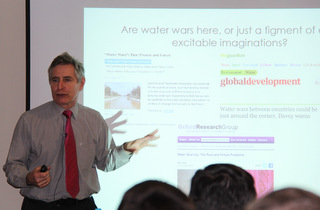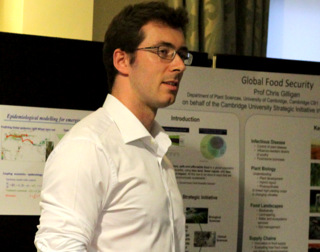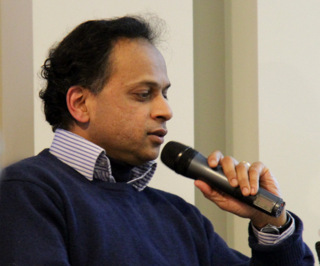Interactions with Industry Partners
AB Sugar global operations conference
As part of their annual global operations conference held on 26 February 2013 at the Downing College, Cambridge, AB Sugar invited members of the University of Cambridge Strategic Initiative in Global Food Security to an afternoon of talks, posters and discussions with the aim of exploring how the company could respond to challenges and opportunities posed by global developments.
Professor Howard Griffiths (Plant Sciences), Dr Bhaskar Vira (Geography) and Dr Matt Castle (Plant Sciences) gave presentations for the Global Food Security Initiative:
 |
Professor Griffithstalked about water stress, carbon concentrating mechanisms and genetic innovation in crop plants. He asked the audience to consider questions such as: Are the water wars here, or just a figment of over excitable imaginations? Does sugar cane use less water than sugar beet? He explained the differences between the C3 and C4 pathways and related those to water stress issues in crop production highlighting the relevance of cutting edge research for sustainable crops to food security interests. He showcased a study which demonstrated that C4 Maize (corn) and a C4 weed Echinochloa outperform rice in field trials. In another study, his lab produced sugar beet data identifying physiological markers for drought tolerance. Professor Griffiths' presentation can be downloaded here (12MB pdf) |
||
Dr Bhaskar Viragave an overview of the Strategic Initiative in Global Food Security and issues around political economy. In his presentation, Dr Vira emphasized the issues relating to food markets and the importance of understanding the biophysical limits to agricultural productivity and sustainable intensification. He focused on the issue of land-grabs, the scale and impact of the phenomenon and the role of new agri-business companies (China, India, Japan, Gulf States). The challenge of finding a way forward for agriculture that is inclusive, pro-poor, smallholder based, poverty-reducing and hunger-eliminating was highlighted against a backdrop of intensive farming practices of large multinationals and led to an interesting and thought provoking debate during the Q&A session. Dr Vira's presentation can be downloaded here (1.8MB pdf) |
|||
 |
Dr Matt Castletalked about epidemiological modelling for global food security and how modelling can help with plans to future-proof yields in terms of minimising losses to disease. AB Sugar were particularly interested in ideas for mitigating losses to their two main crops: Sugar Beet and Sugar Cane, in the event that current genetic and chemical controls prove inadequate. This type of failure in maintaining crop disease resistance has already been seen in breakdown of genetic resistance in UG99 stem rust in Africa, chemical resistance in Potato late blight worldwide and introduction of new species in case of HLB in Florida. |


